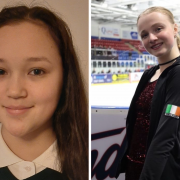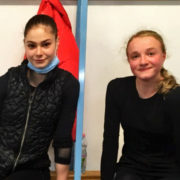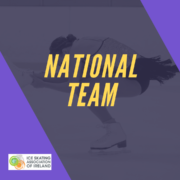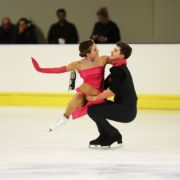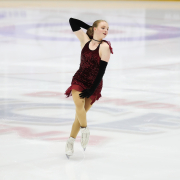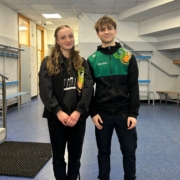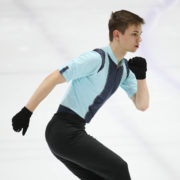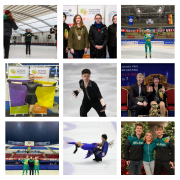Women In Sport Week: High Performance
To mark Women In Sport Week (6-12 March), the Ice Skating Association of Ireland asked the women who make ice skating happen in Ireland a series of questions to hear about the challenges and unique culture of the sport within the country.
Today we focus on Laura Hegarty and Sophia Tkacheva, two members of the figure skating national team who represent Ireland internationally in competitions. Hegarty, along with her brother Kevin Hegarty, competes in ice dance, while Tkacheva particpates in singles skating.
What inspired you to get involved in ice skating, and how has the sport influenced your life?
Hegarty: Ice skating has been a part of my life since childhood. The sport has allowed me to travel abroad through competitions and training, expanding my understanding of other athletes and their culture.
Tkacheva: I started ice skating when i was five years old and as an easily-influenced child I was watching TV one day and my parents put on the sports channel to keep me entertained. A women’s’ice skating competition came on and I was instantly mesmerised. In this very moment, I realised that this is exactly what I wanted to do and my life has never been the same since. If it wasn’t for the women ice skating on the TV screen, I wouldn’t be where I am right now. I wouldn’t have had the opportunities to represent Ireland at countless international competitions, including the Junior Grand Prix. I wouldn’t have had the experiences and discipline that only comes from figure skating and I wouldn’t have learned the significant life lessons that come with this incredible sport. I started ice skating because of the influence of women in this sport and almost 12 years later I’m skating like I wanted to when I was five.
Women in sport have historically faced barriers to participation and recognition. Have you experienced any challenges or obstacles in ice skating in Ireland because of your gender?
Hegarty: I haven’t felt any restrictions either in training or in competitions. Gladly, it’s an easily accessible sport to any sex. Unlike sports like football or rugby, the “field” (rink) isn’t separated by gender.
Tkacheva: As a woman in ice skating in Ireland, I’ve experienced both obstacles and challenges in my career. There were times where I’ve felt that my injuries and pain weren’t taken seriously because I was labelled as “dramatic” or that I was “overreacting” and other stereotyped micro aggressions which completely dismissed me and my experiences in this sport as a whole. The lack of resources for training and practice in this country are definitely the biggest obstacle that I’ve faced in my career. The struggles that come from not being able to train for the sport that has shaped my life because of greater focus on training resources distribution to more male dominated sports is astounding. Ice skating is a sport that is underestimated and overlooked in Ireland and I as a woman in ice skating have felt the effect of this more than anything. There have also been several occasions where I, as an ice skater, have not been taken seriously and was even laughed at when I mentioned my participation in this sport.
What do you feel are the positive aspects of being a woman involved in ice skating in Ireland?
Hegarty: Statistically there are more women in the sport, and therefore, I feel a strong sense of an empowering community.
Tkacheva: There is an abundance of positive aspects of being a woman in ice skating in this country. From my experience, since it is so unusual and unheard of, this sport is greatly admired by people. It’s not a common skill, so people tend to be very impressed when they find out that I’m an ice skater. Being a woman in this sport I also feel like there is a great support circle specifically around women. At all competitions, women always help each other out in any way and it is very comforting to know that despite the difficulties of being a woman in ice skating, there will always be other women athletes supporting me.
Representation and visibility are important issues in all areas of life, including sport. What would you like to see happen in the world of ice skating to encourage more women to participate and succeed ?
Hegarty: Within Ireland I definitely believe the rate of participation from not only women, but the general public will increase with the presence of an ice rink. Globally the sport is being popularised through media. The more access people have to figure skating and its facilities, the more people will attempt it and potentially succeed.
Tkacheva: The biggest limit that is preventing women from participating and succeeding in ice skating is access to training resources, specifically in Ireland. There is simply no way for more women to participate in a sport that only seems to exist during Christmas time at small, temporary ice rinks. It is the main issue surrounding the world of ice skating in Ireland and if it is not dealt with, there is little to no chance of an increase of participation and success of women in ice skating in Ireland. This is especially discouraging, so the first course of action here would be to build an ice rink in Ireland. Something else that I would like to see happen in the world of ice skating to encourage women would be an increase in representation of women in this sport. This would lead to more support for women from all around the globe which will lead to encouragement to participate and succeed in ice skating.
